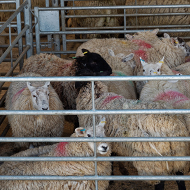New SCOPS quarantine resources for vets

Protection of flocks relies on a combination of treatments and testing.
New resources to help vets better assist their sheep-farmer clients have been published by the Sustainable Control of Parasites in Sheep (SCOPS) group.
The resources include a six-step guide for roundworms, scab and fluke, with information on risk assessment, treatment, isolation, testing, joining the flock and, where appropriate, re-treatment.
Available on the SCOPS website, the resources also include calendar-based examples covering different scenarios, together with a blank calendar that can be customised for individual farms.
Lesley Stubbings from the SCOPS Steering Group explained: “Flocks are at their most vulnerable when sheep are brought in from elsewhere. Many of the disease threats are not visible, so protection relies on a combination of treatments and testing
“However, there are so many different parasites to consider that an effective quarantine protocol can look complex and offputting. With help from their vet or adviser, sheep farmers can put a workable, effective plan that will safeguard their flock from the threats in-coming sheep pose – which is why SCOPS has put considerable effort into creating these new resources to arm vets and advisers with accessible information.”
SCOPS chairman Kevin Harrison, who is also a Gloucestershire sheep farmer, added: “An important new element in the SCOPS materials is the application of the sheep scab ELISA test, developed by Moredun. The blood test is quick, inexpensive and reliable and can pick up exposure to sheep scab from as little as two weeks after infection.”
“It is a fantastic new tool for the industry and adds a new element to the SCOPS advice. However, we appreciate it can be difficult for farmers – so hope accessible guidance aimed at their vets and advisers will provide the support they need.”



 The latest
The latest